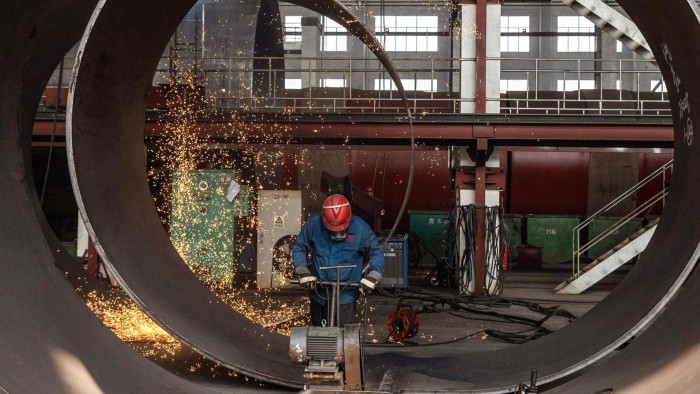China’s economy grows faster than expected in third quarter

Simply sign up to the Chinese economy myFT Digest -- delivered directly to your inbox.
China’s gross domestic product grew 4.9 per cent year on year in the third quarter, beating market expectations as Beijing steps up support for the world’s second-biggest economy.
The economy expanded 1.3 per cent on a quarterly basis, China’s National Bureau of Statistics said, regaining some momentum after growth of just 0.5 per cent in the April-June period.
Economists polled by Reuters had expected third-quarter year-on-year growth of 4.5 per cent. Wednesday’s figure compares with year-on-year GDP growth of 4.5 per cent in the first three months of the year and 6.3 per cent in the second quarter.
The stronger year-on-year growth figures also reflect a comparison with a period of rolling lockdowns last year, before the end of Xi Jinping’s pandemic controls.
Chinese officials struck a cautious tone. “We should be aware that the external environment is becoming more complex and grave while the domestic demand remains insufficient and the foundation for economic recovery and growth needs to be further consolidated,” the NBS said on Wednesday.
To push China towards its annual growth target of 5 per cent — already the lowest in decades — Beijing has in recent months tried to stabilise the property and banking sectors and shore up support for the country’s stock market and renminbi.
Sheng Laiyun, an NBS spokesperson, said China was on track to hit the 2023 target, with the economy continuing to improve into the fourth quarter. But he added that the pandemic’s impact on the private sector had been “severe” and the government needed to boost support.
Alicia García-Herrero, chief Asia-Pacific economist at Natixis, said the breadth of Beijing’s recent stabilisation measures showed it was responding to “cracks” emerging in the financial system.
“Mild growth of 5 per cent for the year won’t be enough, it seems to me, to cover those cracks,” she said. “If the world goes in the wrong direction . . . it is going to be very difficult for China to avoid those cracks getting deeper.”
Retail sales, a gauge of consumer spending, were 5.5 per cent higher in September compared with the same month last year. There were hopes for double-digit growth this year coming out of the pandemic.
Fixed-asset investment, an important measure of capital spending in China, rose 3.1 per cent in the nine months to the end of September. Beijing has sought to boost high-tech manufacturing and chase technological self-sufficiency.
Property investment in the first nine months of the year was down 9.1 per cent, reflecting sector-wide debt defaults by developers and weak apartment sales. New housing starts have fallen more than 20 per cent so far this year compared with 2022, the data also showed.
Xi’s administration is trying to steer the Chinese economy away from debt-fuelled investments towards more sustainable growth, underpinned by consumer services and high-tech manufacturing, while also better supporting the leader’s national security objectives.
Achieving that shift has been made more difficult after China failed to rebound as expected from the pandemic and as the country’s property sector slowdown saps consumer and business confidence.
Private sector investment was down 0.6 per cent at the end of September, a further slowdown from a decline of 0.2 per cent at the end of June.
Industrial production, which powered Chinese growth during much of the past three years, was 4.5 per cent higher in September year on year.
However, there is uncertainty over China’s exports as the war between Israel and Hamas in the Middle East has added to problems caused by a deterioration in US-China ties.
Goldman Sachs analysts said recent data suggested “more green shoots” in the economy into the fourth quarter. However, they expected further policy easing measures “given persistent weaknesses especially from [the] property downturn and still-fragile confidence”.
The CSI 300 index of mainland China-listed companies was down 0.7 per cent after the data release.
Marcella Chow, global market strategist at JPMorgan Asset Management, said sectors such as advanced manufacturing and renewable energy should benefit from sustained policy support from Beijing.

Comments